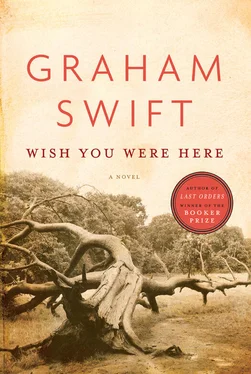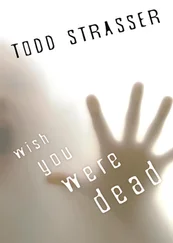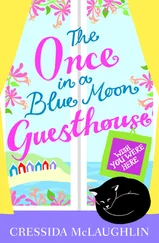And it was only later, when she was gone, that it occurred to him that another gist, and perhaps the real gist, of those conversations was precisely that. That she was telling him that she wouldn’t always be there. It was what she’d had in her mind perhaps — and he’d been right to have those strange feelings — even when she first told him about Tom. She’d be gone sooner than anyone might think.
She was more of a Luxton, it could be said, than the Luxtons themselves. When she died it was as if the whole pattern was lost. Yet her name had once been Newcombe, and until she was nineteen she’d never even known life on a farm. She was the daughter of a postmaster. One day Michael Luxton had plucked her from the post office in Polstowe and carried her to Jebb Farm and, so it seemed, nothing could have better answered her hopes and her wishes.
Something like that must have happened. Jack had never known, even from his mother’s lips, the actual story. His dealings with Ellie Merrick didn’t seem a useful guide. But he found it hard, or just vaguely trespassing of him, to imagine that his father, his father of all people, might once have carried his mother, her legs kicking, over the threshold of Jebb Farm and possibly even have carried her, without a pause, straight up to the Big Bed — where two years later he, Jack, would be born and where, twenty-one years after that, Vera Luxton would die.
He’d sometimes daringly think that the business of birthright might work in reverse. That his mother’s birthing him, more than her taking his father’s name, had made a Luxton out of her. She’d had such a bad time with him, Jack supposed, that it had generally been accepted that she couldn’t be a mother again. So everything was pooled in him. Or, looking at it another way, it was his fault. Eight long years had proved it. Then Tom had come along and taken away the blame. Which was another reason why suddenly having a little brother around was never a problem for Jack. Quite the opposite.
Anyway, there were those conversations. And anyway, by the time Vera lay dying in that big bed, she’d become so much a Luxton that despite the determined efforts of the health authorities to move her into hospital, she refused to be taken from Jebb Farm. As if she were putting down her final roots.
He’d always remember — though he’s tried to forget them — her last days. How she clung, sometimes literally, to that bed as if she wanted, perhaps, to become it. Or the bed, perhaps, wanted to become her. His father, as if not to intrude on this intimate process, had slept, or rather kept terrified watch, close by in a sort of separate bivouac made out of the old wooden chest pushed up against the room’s solitary, battered armchair. The room was like some compartment of disaster.
Well, at least she was spared, Jack can say to himself now, the long road to ruin, and worse. Though it was not so long, really, after her death. How it would have appalled and shamed and simply disappointed her. How she must have flinched, again and again, in that grave of hers in Marleston churchyard. But then if she could have flinched — Jack can sometimes lose his own logic — she wouldn’t have been spared.
He can’t decide the matter. His mother is dead, yet she has never not been, in theory, at his shoulder. He wants her not to have known and suffered or even witnessed all the things that followed her death. Including all this now. But that would be like wishing her dead. Merely dead.
Only yesterday Jack had been obliged to stand close to his mother’s grave. Had she known? How could she have borne it to know, under the circumstances? But if she’d known, then surely she’d have let him know, he’d have felt some tug — something even like the tug of those empty caravans — and surely she’d have cried out, somehow, when he’d left in that sudden, uncontrollable haste, ‘Jack, don’t go. Don’t rush off like that.’ And surely, if she had, he’d have stayed.
All of them there together, for that short, agonising while, all of them under the same pressing circumstances, but him the only one left above ground.
And all of them there (except him) right now, he thinks, right this minute, under this wind and rain. The wind plucking the browning petals from all those flowers, toppling the stacked-up bunches and wreaths, the rain rinsing the gravestones, new and old, the water seeping down through the soil.
Jack can’t decide the matter. Do they feel it, know it all, or are they spared? He could say he’s about to find out.
WHAT WOULD his mother think (he tries not to think about it) if she could see him now?
But what would she have thought, anyway, to see him no longer at Jebb Farm but here by the sea, tending a herd of caravans? What would she think to see him hitched up — properly and officially married — to Ellie Merrick? But that once-impossible yet inevitable thing — who else was it going to be? — would surely have been only what she’d have wished. If only she’d had the power to knock two stubborn male heads together and make it happen herself.
But it hadn’t happened, anyway, in Marleston church. No wedding bells reaching her, six foot below in the Devon earth, making her smile. My son Jack’s getting married today. And he hadn’t felt her presence — her touch, her whispered approval — in that registry office in Newport.
And now, look, with a gun on their marriage bed.
And what would she have thought to see him and Ellie taking off every winter, for three weeks or a whole month sometimes, to sun themselves under coconut palms and drink tall drinks with paper parasols stuck in them? Never mind that they were here by the seaside, near a beach, in the first place. But that was what Ellie had thought they should do, they could afford it and they should do it, and why shouldn’t they have their holidays? And he, with a little coaxing at first, had gone along with it. And not a bad arrangement at all. Certainly according to the caravanners — the ‘Lookouters’. We get a week in the Isle of Wight, you get a month in the Caribbean. Not bad, Jack, for an out-of-work farmer.
It was the regular backchat, not ill-meant, but he’d had to find a way of handling it. No one got shortchanged, no one got a bad deal at the Lookout. He couldn’t arrange the weather (any more than he could at Jebb). You’ll get as good a holiday here as you’ll get there, he’d say, in a way that, he could tell, they felt he really, mysteriously believed. He’d risen to that task: talking to the caravanners, making them feel at home and befriended. He’d been surprised at his talent for it.
He took his holidays these days in the Caribbean. And what of it? Once he’d been tethered, all year round, to a herd of Friesians.
Though, if the truth be known, after a few days of lying under those palm trees and sipping those drinks and smiling at Ellie and rubbing sunscreen on her, he’d sometimes start to think anxiously about his caravans. Whether they were all right. Whether they were withstanding the winter storms. Whether that security firm — Dawsons — was really any good and whether anyone was actually patrolling the place, while he was lying here where once he could never have dreamed of being. And then he’d think, because it was the thought he was really always having to bat away, like batting away one of those big bastard tropical hornet things that could come at you suddenly out of nowhere: what would his mum think?
Well, Jack, my big old boy, it’s a far cry from Brigwell Bay. That’s what she’d think. Or from hosing down the milking parlour.
And then he’d think of Tom.
‘Farmer Jack’. He never quite knew how the word had got around. Farmer Jack, milking his caravans. Here comes Farmer Jack in one of those shirts he got in Barbados. The ones that make your eyes hurt. What would they have thought if they could actually have seen him in the parlour in his faded blue boiler suit and his wellies? Being barked at by his father. What would his mum have thought if she could see him in one of those shirts?
Читать дальше








![Питер Джеймс - Wish You Were Dead [story]](/books/430350/piter-dzhejms-wish-you-were-dead-story-thumb.webp)



